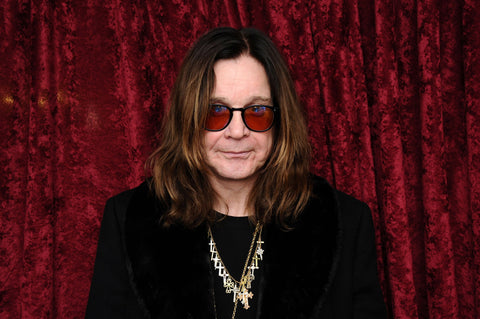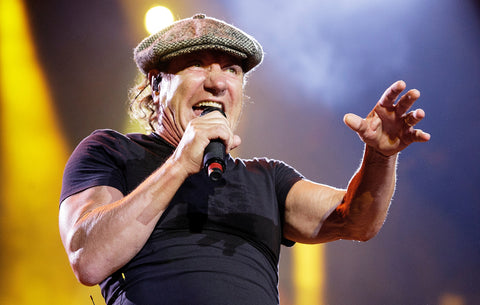
Tinnitus is a medical condition that causes one to hear a ringing, hissing, or whooshing noise in their ears without an external source of the sound. In most cases, the sound is only heard by the tinnitus patient, but in other cases, like in pulsatile tinnitus, a doctor may hear the sound with the help of a stethoscope.
Certain factors can cause tinnitus. Some of these causes are; middle ear infection, ototoxic medications, exposure to loud noise levels, earwax blockage, age, autoimmune inner ear disease, head tumor or trauma, atherosclerosis, and Meniere's disease.
Depending on the cause and the level of damage done to the ear, tinnitus can be mild, severe, temporary, or permanent.
While tinnitus can affect people in different age groups, it is prevalent among individuals with certain occupations. For instance, soldiers and musicians are more susceptible to tinnitus than people with jobs that don't expose them to loud noises.
In this article, we will be examining some musicians with tinnitus, but before we start, let's get some background information on why tinnitus is common among musicians.
The major factor responsible for the prevalence of tinnitus in most musicians is the constant exposure to high sound pressure levels. Daily or more frequently than not, musicians are exposed to loud noise levels from their musical instruments and microphones in both personal practice, rehearsals, and concerts.
Studies have shown that the sound intensity musicians are exposed to during each of their musical activities is beyond the normal limits of tolerance, and this endangers their hearing health.
The acceptable sound level for humans is 80 decibels, but musicians are often exposed to sound levels that are as high as 120 decibels.
This overexposure to loud noise levels does not just happen during concerts. It also happens during their normal daily activities, one of which is listening to music to improve their singing skills. This can be done using headphones or earpieces or very loudspeakers at home or in the studio.
While the musician thinks these exercises improve his skills, unknown to him, he is also damaging his ears. The major part of the ear that is affected by exposure to loud noise levels is the hair cells in the inner ear.
Constant exposure to loud noise can cause these hair cells to deteriorate, and when they are finally damaged, there is no remedy. And this can cause tinnitus, permanent hearing loss, or deafness.
Aside from the fact tinnitus can be annoying and distracting, for most musicians, the effects also spill into their work life. They may be unable to function properly and may experience certain musical difficulties. If not handled well, tinnitus can deteriorate and ruin the career of a musician.
Over the years, many renowned musicians in the world have experienced some form of hearing loss or impairment. For some, it is consistent tinnitus, and for others, permanent hearing loss or deafness. A recent statistic shows that about 60% of the rock and roll hall of fame musicians have hearing impairment; while this may not be shocking because we know the reason for the hearing impairment, the statistics are still alarming.
This huge effect on the hearing of musicians is not restricted to just rock and roll musicians but also other types of musicians, DJs, and instrumentalists.
Below are some famous musicians that have tinnitus.
1.Moby

Richard Melville Hall, popularly known as Moby, is an American musician, singer, songwriter, and producer who was born on September 11, 1965.
He has released many albums, including Moby(1992), Ambient(1993), These systems are failing (2016), Animal Rights(1996), and many more. Moby has sold about twenty million records of his songs worldwide.
Moby has had to battle with tinnitus for a long while. According to him, when he first started playing in bands, he didn't realize the importance of wearing hearing protection, so he never wore any.
Despite not wearing ear protection, he and his team still played as loud as they could. This continued for a while. Suddenly, one night, after coming back from a punk rock show, he discovered his ears were ringing.
This wasn't the first time he experienced this, he had experienced ringing in his ears almost after every show, but this ringing was different. Because unlike the previous ringing episodes, this one didn't disappear overnight. When he woke up the next day, the ringing was still there; well, the ringing never disappeared.
This made him realize the importance of protecting his ears from exposure to loud noise. He started wearing hearing protection from then to prevent losing his hearing. According to him, "I realized that once my hearing is gone, it will never return"
Even though Moby has joined the statistics of musicians with tinnitus, he has learned to manage his tinnitus well without taking any toll on his career.
2. Chris Martin

Christopher Anthony John Martin is an English songwriter, singer, multi-instrumentalist, and record producer born on the 2nd of March 1977. He is the co-founder, primary songwriter, and lead singer of a rock band known as Coldplay. The band was formed in 1996, but it was called Starfish then. It was renamed Coldplay in 1998.
In an interview he granted in 2012, Chris Martin revealed that he had developed hearing problems. He admitted to not paying much attention to his hearing until he developed a hearing problem.
Ever since he revealed his hearing problems, every team member wears sound monitoring headphones or custom-molded earplugs at concerts.
Chris Martin also ensures that he wears hearing protection. Even though this has not cured the hearing problem, it has prevented the condition from deteriorating.
3. Ozzy Osbourne

Popular heavy metal singer John Micheal Osbourne popularly known as Ozzy Osbourne is another musician with tinnitus. Born on 3rd December 1948, he became popular in the 1970s for his lead vocalist role in the Black Sabbath band.
He has many studio albums to his credit, including Blizzard of Oz, UnderCover, Ordinary Man, Diary of a Madman, Ozzmosis, etc.
Osbourne got a crowd in a stadium to scream the longest crowd scream according to the Guinness world record.
In an interview with Sunday Times of London, Osbourne revealed that he suffers from permanent tinnitus. This means that the ringing in his ears is constant. He described the tinnitus noise as a "wheee!! noise," which suggests that the noise may be high-pitched. The tinnitus has also made him mildly deaf.
Ozzy Osbourne admitted that he didn't wear earplugs whenever he was exposed to loud noise, and that's what caused the permanent ringing. He believes that if he had worn earplugs, his hearing wouldn't have been affected.
4. Phil Collins

Philip David Charles Collins is an English songwriter, drummer, singer, and record producer born in 1951. He is popularly known as the singer/drummer of a rock band called Genesis.
Phil Collins is a music legend that is popular amongst the older generation. He also warmed his way into the young generation’s heart with his soundtrack on Disney's Tarzan.
He suffers from permanent tinnitus and now relies on hearing aids. Phil told "Die Zeit' that his hearing loss came suddenly. It started one day after he had spent the day in his studio singing. When he left the studio, he went to get his daughter from school. When they got home, they ate and decided to play a video game; that’s when the ringing started.
According to him, "suddenly my ear went sssssssshh.” Within a second, his left ear felt like it been underwater and then closed down. All efforts to clear out the ear, including pinching his nose, proved abortive.
His hearing loss affected his ability to perform, which made his career partly come to an end.
5. Anthony Kiedis

Anthony Kiedis is an American songwriter and vocalist and a founding member of the rock band Red Hot Chilli Peppers. He is one of the world’s biggest Rockstars and was inducted into the Rock and Roll Hall of Fame in 2012 alongside his other band members.
Anthony Kiedis suffers from both tinnitus and hearing loss. This permanent damage to his ear began in the 90s during a musical tour.
He and his team performed better than they had planned on that night in a giant room that was packed full of people.
After his performance, he went backstage with a fellow band member, and that's when he realized his ear was ringing. At the end of the tour, it was obvious that he had permanent ear damage.
Since a permanent hearing loss is difficult to cure, he has had to live with it since that night.
6. Neil Young

Neil Young is a Canadian-American musician, singer, and songwriter born in 1945. He is also one of the popular musicians that have hearing problems.
Neil's hearing problems(tinnitus) started in 1991 when he was recording his album "Weld.” In the following year, Neil had to stay away from the stage and music because of the tinnitus effect.
His album 'Harvest Moon' was made because he did not want to hear any loud sounds.
During the early stage of the tinnitus, he had a high sensitivity to loud sounds. Even though this sensitivity to loud sounds has reduced, he still has to live with tinnitus.
Ever since he developed tinnitus, Neil Young has decided to take precautions to protect his ears and hearing health.
7. Eric Clapton

The English rock and roll singer, guitarist, and songwriter Eric Clapton was born on March 30, 1945. He has been inducted into the rock and roll hall of fame three times. He is also referred to as the most influential and important guitarist of all time.
In the early days of his band Cream, being as loud as they could be was the order of the day, and that's probably why Eric has hearing problems.
In a chat with Daily Express newspaper, Eric Clapton said:
“I probably had two 100-watt stacks at the height of things, and I would turn one on for guitar solos; it was just mad.”
The extended exposure to loud noise on stage and the excessive decibels he was exposed make him have tinnitus continuously. It has even been speculated that he is partially deaf in one ear.
Clapton doesn't blame anyone but himself for the tinnitus; he said he thought he was irresponsible and thought he was invincible. After he developed tinnitus, in 1997, he started using 50 Watts Marshalls and Fender Deluxe Reverb amps.
None of these changes could get rid of the tinnitus, but thankfully it's not as severe as it was when it first started. His advice to others is "take care and wear plugs."
8. Will.I.Am

The American rapper, record producer, songwriter, actor, and television personalities Williams James Adam popularly known by his stage name Will.I.Am is the founding and lead member of the musical pop group Black Eyed Pea.
In 2010 he revealed that he was suffering from tinnitus. He described the tinnitus noise as a beeping noise that has always been there every day and all day.
Will.I.Am says he can't be quiet because that's when he notices the ringing. He doesn't know exactly how long he has had it, but it gradually got worse, according to him.
9. Pete Townshend

Peter Dennis Blandford Townshend is a guitarist, composer, singer, co-founder, and the second lead vocalist of one of the most famous rock bands of the 1960s and 70s named Who.
Peter's band, Who held the world record for being the loudest band for ten years, should tell the degree of noise each band member, including Peter, was exposed to. It is therefore not surprising that Peter Townshend and his other band members suffer serious hearing problems.
Peter's tinnitus manifests as a ringing in his ears; the ringing is at the frequency that he plays his guitar, and not only is it frustrating, it is also painful.
In addition to the tinnitus, Peter Townshend is also completely deaf in one ear. This happened during a live performance in the 90s when his drummer blew up his drum sets.
10. Brian Johnson

Brain Francis Johnson is an English singer and songwriter born in October 1947. He became the third lead singer in the Australian rock band AC/DC in 1989, and in 2003 he and his band members were inducted into the Rock and Roll Hall of Fame.
In 2016, Brian announced that he would stop touring with his band. While many people suspected the decision was based on an internal feud, Brian Johnson revealed that doctors had been advised to quit performing live or face total hearing loss.
As devastating as this news was to his career, he had to stop live performances to avoid becoming deaf.
Conclusion
These are just a few of the musicians who suffer tinnitus; there are many more out there who have not openly admitted their hearing challenges.
As stated earlier, the major cause of tinnitus amongst musicians is extended exposure to loud noise without ear protection. Most of the musicians mentioned in this article admitted that they didn't pay close attention to their ears during their performances, which caused the tinnitus.
If you are a musician, ensure that you limit your exposure to loud noise, avoid extended exposure. Whenever you are unavoidably exposed to loud noise, ensure your ears are protected.
Are you a musician with tinnitus? Or do you know any with tinnitus? Let's hear your opinion on this topic.













